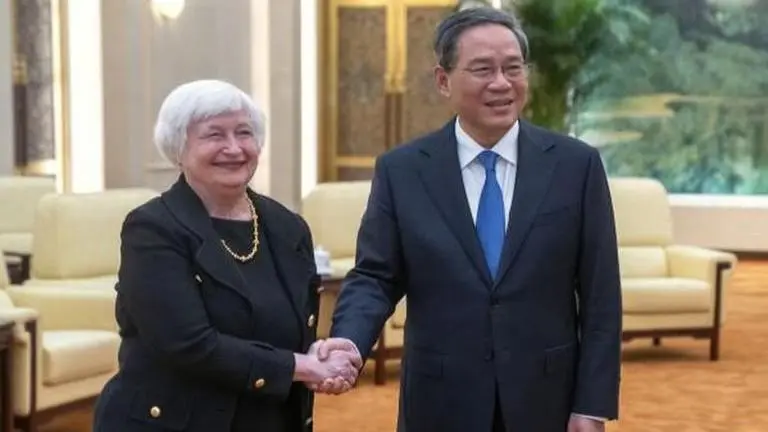Updated 8 July 2023 at 17:47 IST
US Treasury Secy in Beijing, urges China to contribute more to climate finance funds
While China has expressed support for programmes aimed at helping poorer countries address climate challenges, it has been reluctant to contribute financially.
- World News
- 4 min read

Pushing for greater global cooperation on climate change, United States Treasury Secretary Janet L Yellen called on China to contribute to international climate finance funds during her visit to Beijing on Saturday. US President Joe Biden’s administration has been encouraging China, the world's largest emitter of greenhouse gases, to do more to assist developing nations in combating the effects of climate change.
While China has expressed support for programmes aimed at helping poorer countries address climate challenges, it has been reluctant to contribute financially to such initiatives. China argues that as a developing nation it should not be obligated to pay into climate funds designated for wealthier nations. According to the United Nations climate body, China is still considered a developing country, despite its massive manufacturing sector which has catapulted the country as the world’s factory.
Addressing climate change in both China and US interest?
During a meeting with Chinese and international sustainable finance experts, Yellen emphasised the shared interest of the US and China in addressing climate change. She urged China to support existing multilateral climate institutions such as the Green Climate Fund and the Climate Investment Funds, alongside other donor governments.
According to a report by the New York Times, Yellen stated that "climate finance should be targeted efficiently and effectively". She went on to add that if China were to join US and other donor governments in supporting these institutions, it would have a greater impact in addressing climate challenges worldwide.
Advertisement
Both the United States and China are facing mounting pressure from developing nations to increase their financial commitments to climate finance. Developing countries argue that more funding is needed to help them adapt to and mitigate the effects of climate change.
Yellen's visit to Beijing comes as part of the Biden administration's efforts to engage with China on areas of mutual interest, despite the ongoing tensions between the two countries. Climate change is seen as one potential area for collaboration, as both nations recognize the urgent need to address the global climate crisis.
Advertisement
While it remains to be seen how China will respond to the call for increased contributions to climate finance funds, Yellen's message highlights the importance of international cooperation and shared responsibility in addressing the climate challenge.
Here is what else you need to know
China's status as a developing nation and its perceived advantage in leveraging this classification has been a subject of controversy and debate in international relations and global governance for quite some time. The controversy revolves around the economic and geopolitical implications of China's categorisation as a developing country and the resulting benefits it claims under various international agreements.
One of the key issues is China's classification within the United Nations Framework Convention on Climate Change (UNFCCC) as a developing country. This categorisation allows China to access certain benefits and exemptions granted to developing nations, such as financial support and more lenient emission reduction targets.
However, with China's rise as the world's second-largest economy and largest emitter of greenhouse gases, critics argue that its status as a developing country is outdated and no longer reflects its economic and environmental realities.
China's growing economic prowess and industrial capacity have also fueled concerns that it is taking advantage of its developing nation status to gain unfair advantages in trade, intellectual property, and other areas. Critics argue that China enjoys preferential treatment and exemptions meant for less developed economies, enabling it to pursue policies that promote its own economic interests at the expense of other countries.
For example, China's eligibility for special and differential treatment (SDT) provisions under the World Trade Organization (WTO) allows it to receive certain trade benefits, such as longer transition periods for implementing trade obligations and exemptions from specific commitments. This has drawn criticism from some countries, particularly developed economies, who argue that China's economic strength and global influence should warrant a reevaluation of its entitlement to SDT provisions.
Published By : Sagar Kar
Published On: 8 July 2023 at 17:47 IST
